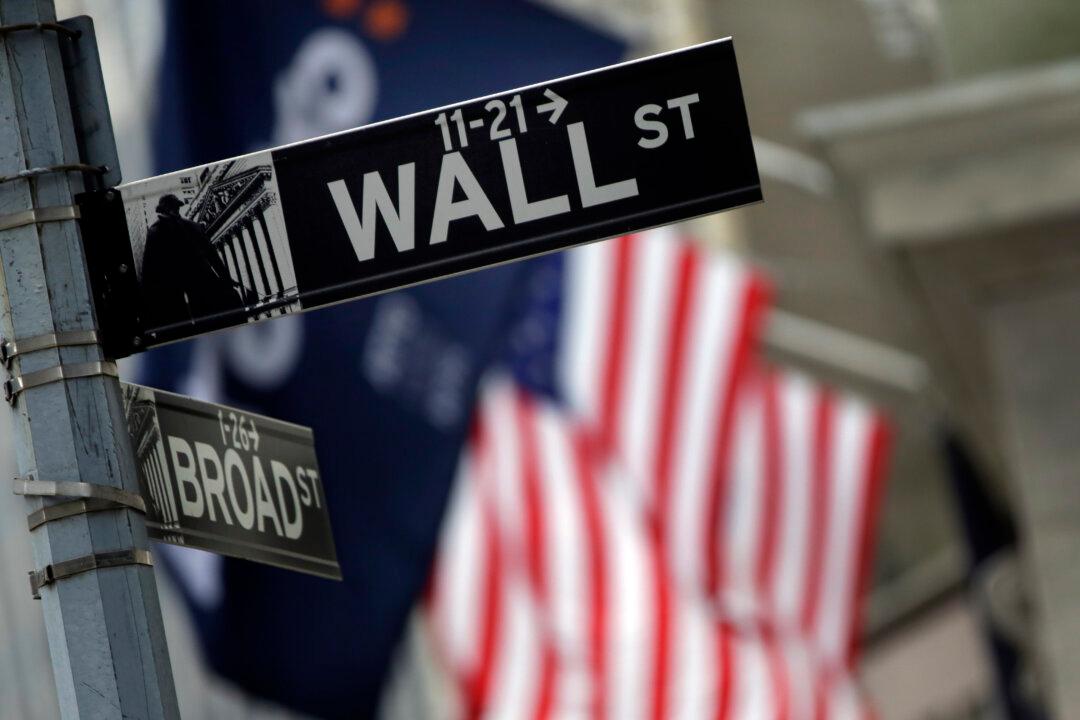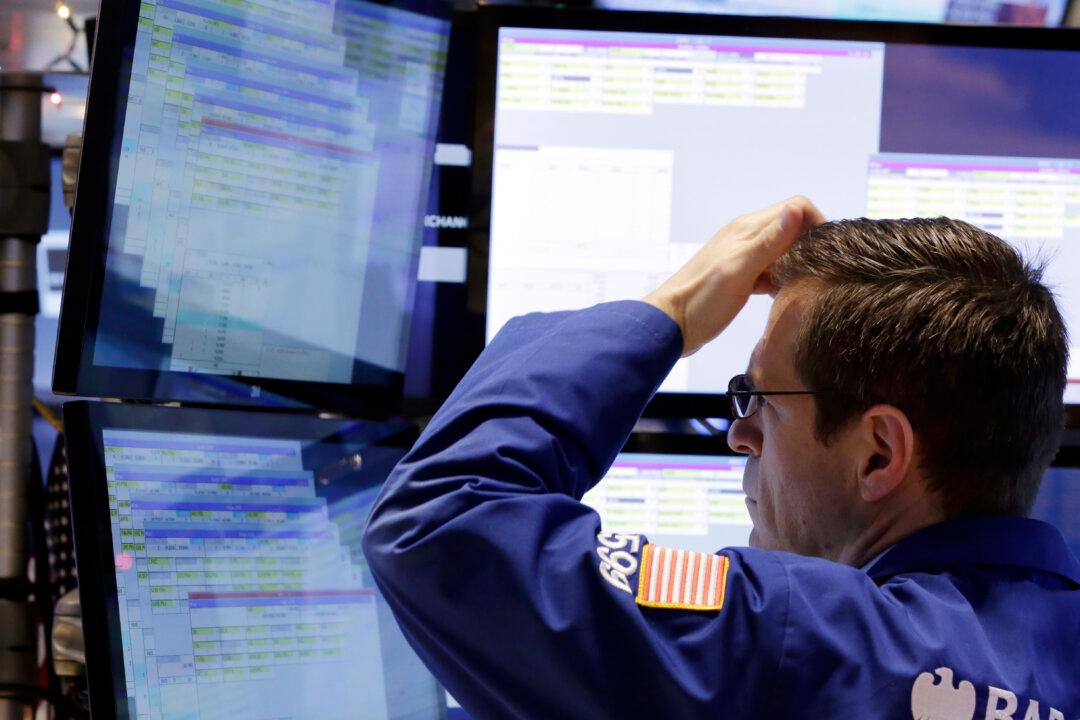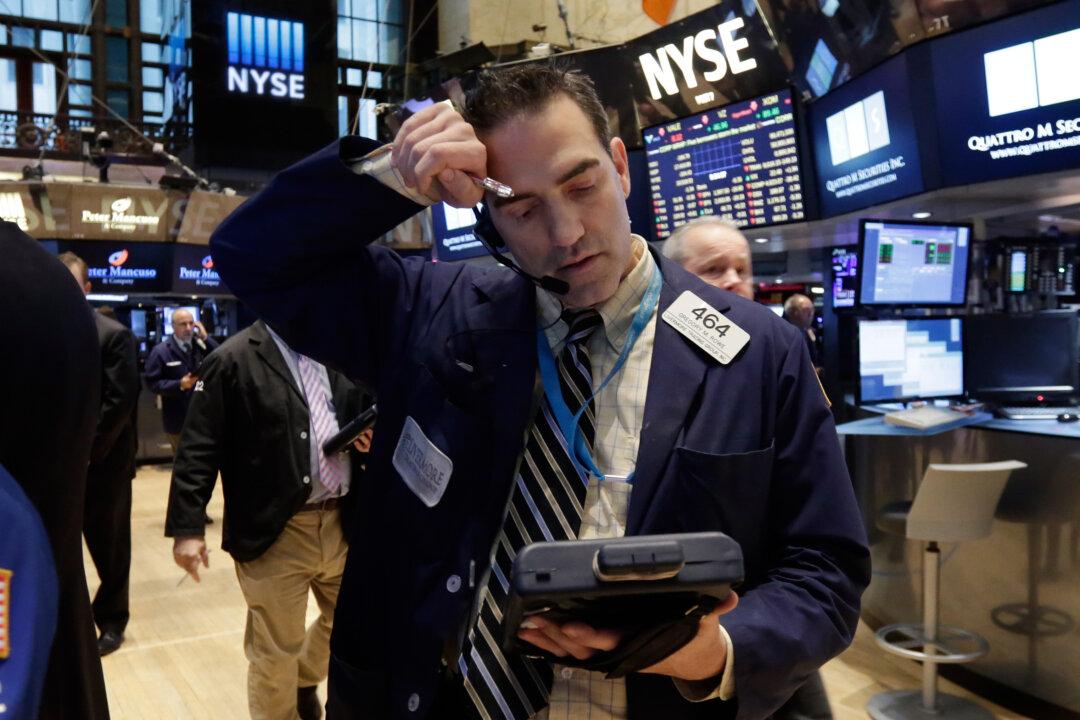NEW YORK—Sudden twists in the price of oil and currency trading turned the stock market into a roller-coaster ride on Tuesday.
Major indexes opened lower as falling oil prices and a plunge in the Russian ruble weighed on markets. Less than an hour later, crude oil recovered and oil and gas producers surged, driving the Dow Jones industrial average up as much as 246 points in the morning.
By the end of the day, however, all of the gains were wiped out.
“Today was definitely an interesting day,” said Jonathan Lewis, Chief Investment Officer of Samson Capital Advisors.
The Standard & Poor’s 500 index ended with a loss of 16.89 points, or 0.9 percent, to 1,972.74.
The Dow Jones industrial average lost 111.97 points, or 0.7 percent, to 17,068.87, while the Nasdaq composite dropped 57.32 points, or 1.2 percent, to 4,547.83.
The turbulence drove traders into the safety of U.S. government bonds, driving prices up and yields down. The yield on the 10-year Treasury note sank to 2.06 percent from 2.12 percent late Monday, a big move in the normally placid market.
The volatility in financial markets is likely to last until oil prices find a stable floor, said Marc Zabicki, senior market strategist at Ameriprise Financial.
“Lower oil prices certainly are a net positive for U.S. consumer spending,” he said. “But there’s a contagion risk out there that investors have an eye on. Namely, what does it do to shale gas players, and what does it mean to the banks that lend to them?”
Since reaching a record high of 2,075.37 on Dec. 5, the S&P 500 has fallen into a slump, losing ground on six of the past seven trading days. Energy companies have been hit hard, a result of the ongoing slump in crude. The S&P 500 has lost 4.6 percent so far this month. December, usually one of the market’s best months, hasn’t lived up to its reputation.
Russia’s currency, under pressure from lower oil prices and Western sanctions over Moscow’s conflict with Ukraine, dropped 20 percent before recovering slightly. That followed a move by Russia’s central bank to hike its benchmark interest rate to support the ruble.
The price of U.S. oil settled higher on Tuesday for the first time in a week, rising 2 cents to close at $55.93 a barrel in New York. Oil has fallen by nearly half since June as demand wanes and supply surges.
Major markets in Europe surged. France’s CAC 40 gained 2.2 percent, while Germany’s DAX picked up 2.5 percent. Britain’s FTSE 100 climbed 2.4 percent.
John Manley, chief equity strategist at Wells Fargo Fund Management, said that the trouble in developing countries highlighted the stability of the U.S. economy and its stock market.
“Yes, I do worry about Russia, yes I do worry about Venezuela, and you can’t really have oil come down more than 45 percent without somebody having a problem, somewhere,” Manley said. “But there’s an old saying on Wall Street, ‘In a dog-eat-dog market, get yourself a big dog,’ and the U.S. is the ultimate big dog when it comes to this sort of thing.”
Falling oil prices have also hammered markets in the Persian Gulf. Dubai’s main market and Abu Dhabi’s closed at their lowest points of the year on Tuesday with losses of 7 percent. Saudi Arabia’s stock market fell 7.3 percent. Many are concerned that the drop in the price of oil will lead to less government spending and political unrest.
Back in the U.S., oil’s slump has battered the market for the riskiest corporate debt. Oil and gas companies make up roughly 13 percent of the junk-bond market, which is on course for its worst monthly loss in three years.
In other trading on Tuesday, Talisman Energy soared 48 percent following news that Repsol, a Spanish oil and gas producer, plans to buy the Canadian company for $8.3 billion. The merger would create one of the world’s largest privately owned oil and gas companies, Repsol said. Canadian courts and shareholders still have to sign off on the deal. Talisman’s stock gained $2.46 to $7.58.
Apple fell $1.48, or 1.4 percent, to $106.75. The company said it has halted online sales of its iPhones, iPads and other products in Russia, citing the financial turmoil triggered by the steep decline in the country’s currency.
Precious and industrial metals futures fell. Gold declined $13.40 to $1,194.30 an ounce, and silver fell 81 cents to $15.75 an ounce. Copper slipped two cents to $2.86 a pound.
Brent crude, a benchmark for international oils used by many U.S. refineries, fell $1.20 to close at $59.86 in London.
In other trading on the New York Mercantile Exchange:
- Wholesale gasoline dropped 3.5 cents to close at $1.541 a gallon.
- Heating oil lost 4.2 cents to $1.960 a gallon.
- Natural gas dropped 10 cents to $3.619 per 1,000 cubic feet.
From The Associated Press. AP Markets Writer Steve Rothwell contributed to this report.




